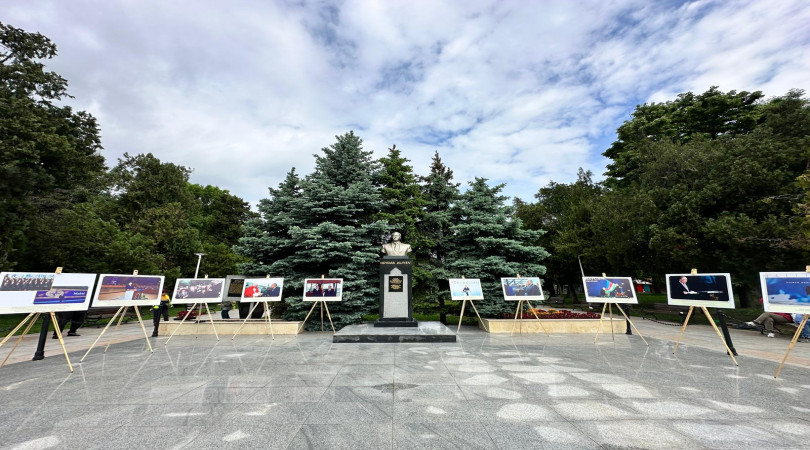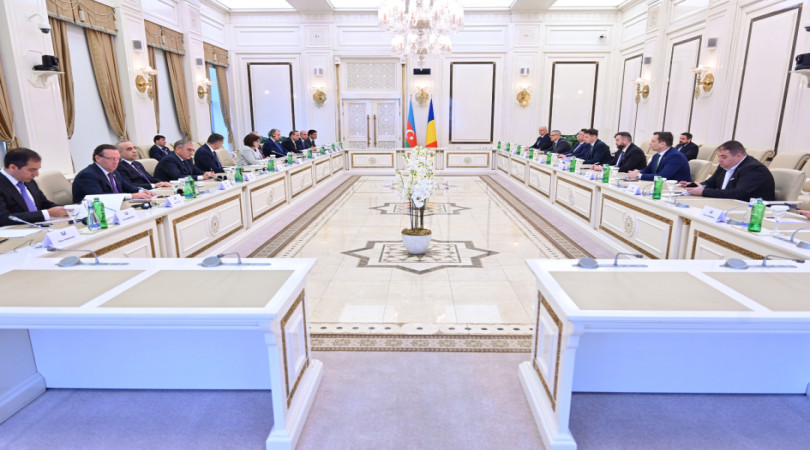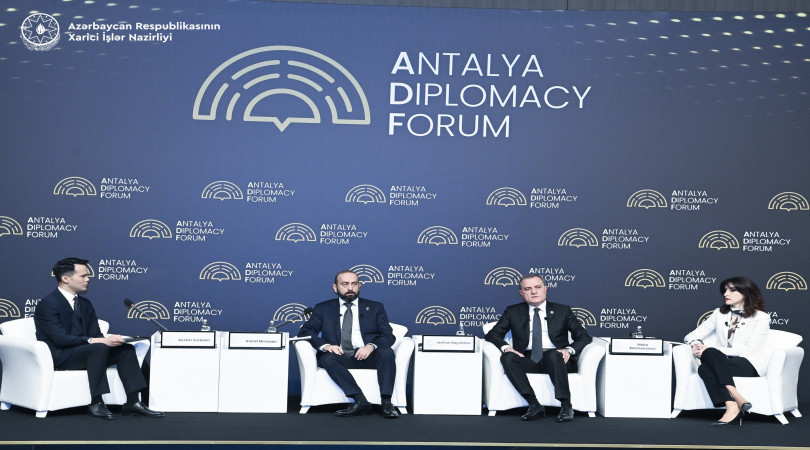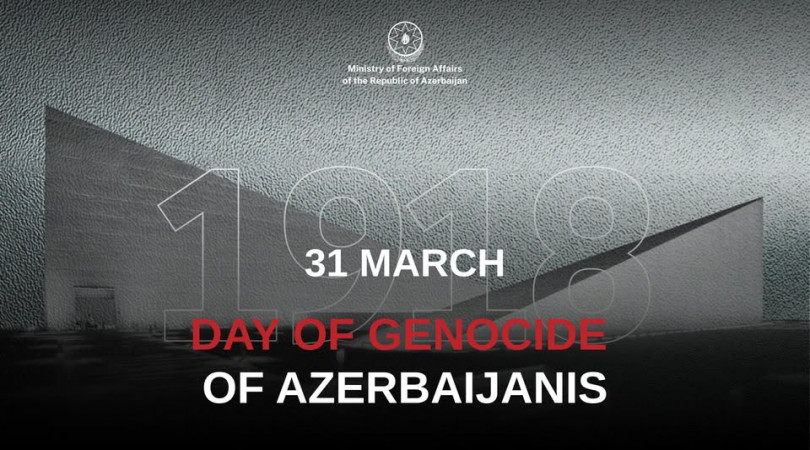„The Nagorno-Karabakh conflict is over and the time has come to think of the future” – Interview with H.E. Dr. Huseyn N. Najafov, Extraordinary and Plenipotentiary Ambassador of the Republic of Azerbaijan to Romania.
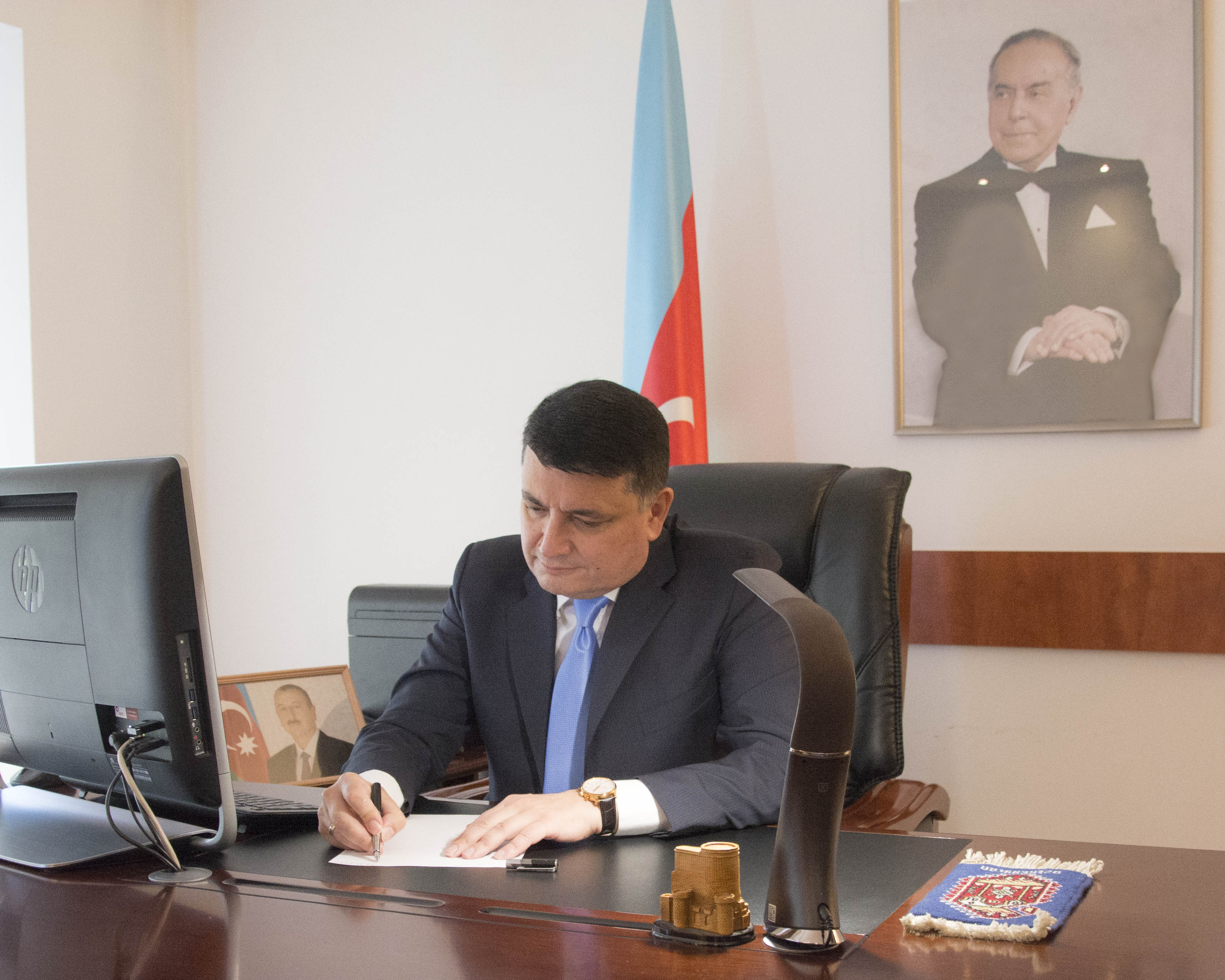
Esteemed Ambassador, nice to see. However, immediately after the war, the new situation and realities appeared in the region and today during our interview, we would like to touch on the same topic, but mostly to speak about the period after the 44 day War. Your Excellency, attacks on civilians and civilian infrastructure and use of foreign terrorist fighters were the most discussed topics during the 44 day War. Could you share your view on the matter with us?
Thank you very much for having me today, it is a pleasure to see you and answer your questions. As you know, on September 27, 2020, in response to the large-scale provocation of the Armenian Armed Forces on the front line, the Azerbaijani army conducted counter-offensive operations, acted exclusively within the internationally recognized borders of Azerbaijan, and strictly complied with international humanitarian law. During the 44-day Patriotic War, under the leadership of Supreme Commander-in-Chief, the brave Azerbaijani Army showed great courage and high combat readiness and returned our lands, which had been under the occupation for almost 30 years. The new phase of the aggression by Armenia started on September 27, 2020 was accompanied by serious war crimes, crimes against humanity and state terror, such as indiscriminate and deliberate targeting of civilians, civilian infrastructure, including schools, kindergartens and medical facilities in densely populated residential areas located far from the conflict zone. In total, as a result of direct and indiscriminate attacks carried out by the armed forces of Armenia between 27 September and 9 November 2020, 101 Azerbaijani civilians, including 12 children were killed, 423 civilians were wounded. The range and consistency of the attacks as well as the statements of the Armenian side before and during the military operations proved once again that the attacks on Azerbaijani civilians and civilian infrastructure have been pre-planned and executed as a part of Armenia’s war strategy aiming at spreading panic among the Azerbaijani public. According to various estimations, thousands of mercenaries and terrorists from Middle East and CIS countries had been deployed to the conflict zone by Armenia. Despite the ongoing pandemic, significant increase was observed in flights from these countries to Armenia. This included both regular flights to Armenia, as well as from the places which never had flights to Armenia. Mercenaries and terrorists were brought to Armenia via these flights and then were deployed to the conflict zone in order to fight against Azerbaijan and organize terrorist activities against Azerbaijani civilians. In most cases, the Government of Armenia and Diaspora organizations organized special campaigns, including fund raising and ticket sales, and define assembly points for the mercenaries. Detailed information regarding the use of foreign terrorist fighters by Armenia has been widely presented to the international community, including in the form of documents of the UN Security Council. High-level Armenian officials, including the Prime Minister, has publicly acknowledged that foreign nationals had been involved into the military campaign against Azerbaijan, which testifies to the serious violation by Armenia of its obligations under international law, including humanitarian law, as well as relevant resolutions of the UN Security Council regarding the foreign terrorist fighters. Armenia in an open attempt to cover-up its above-mentioned wrongdoings constituting war crimes and crimes against humanity, brazenly accuses Azerbaijan of the same with a view to diverting the attention of the international community, and to that end carries out a massive campaign of fake news. Azerbaijan has resolutely rejected all these accusations and called on those who seem to be affected by Armenian propaganda machine to present evidence in support of their claims. Not surprisingly, no single evidence has thus far been presented to support these groundless claims.
Could you give us the information on human rights and steps taken by Azerbaijan to comply with International Humanitarian Law after the war?
Azerbaijan is committed to upholding its obligations under International Humanitarian Law (IHL) and the principles of humanity. More generally, Azerbaijan has taken measures necessary to prevent any act of violation by its servicemen of International Humanitarian Law. The Ministry of Defense of the Republic of Azerbaijan, in cooperation with the ICRC, has prepared special brochures with instructions on compliance with combat rules and other elements of international law, including treatment of civilian population during the conduct of war, and handed them over to the servicemen of the Armed Forces of Azerbaijan. We fully comply with the relevant provisions of the Trilateral Statement and IHL. Accordingly, Azerbaijan has consistently fulfilled its obligations to ensure the rights of Armenian servicemen and other detainees captured in the course of the conflict. Information about the Armenian captives has been regularly provided to the International Committee of the Red Cross and the Russian peacekeeping contingent. In some instances, Armenian captives were unilaterally released. Azerbaijan has returned all persons detained during the hostilities. During their detention in Azerbaijan, the Armenian servicemen were provided with the necessary medical care and dignified treatment, were given the opportunity to keep in touch with their families, and were provided with other rights. Azerbaijan has provided all the conditions for the search and retrieval of remains of Armenian servicemen. Thus far, remains of more than 1300 Armenian military servicemen have been retrieved. Azerbaijan has provided access and all the necessary conditions for the representatives of the ICRC and the Russian peacekeeping contingent, as well as the families of the fallen Armenian soldiers to search for the remains of Armenian servicemen in the recently liberated territories. Azerbaijan, consistent with its obligations under international humanitarian law, has also taken very seriously the allegations of inhumane and degrading treatment by some Azerbaijani servicemen over the captured Armenian military. On the basis of the materials collected in connection with those allegations, the Military Prosecutor’s Office of Azerbaijan has initiated criminal investigations. Thus far, the Prosecutor’s Office has identified 4 military servicemen of the Azerbaijani Army as potentially being responsible for illegal acts and as a result, has initiated a criminal case against them. Investigative operational measures by the Prosecutor General’s Office still continue. Regretfully, unlike Azerbaijan, Armenia has not fulfilled its obligations arising from international humanitarian law and the trilateral statement, including its paragraph 8, which provides the exchange of prisoners of war, hostages and other detained persons, and dead bodies. Armenia has not taken any step to investigate and take punitive actions in relation to its servicemen who have committed war crimes in the course of recent hostilities, despite the existence of a considerable number of photographs and videos depicting a number of human rights violations by Armenian servicemen against Azerbaijani captives, including acts of humiliation and ill-treatment, such as physical assault, verbal abuse, executions through beheadings, and ill-treatment of dead bodies.
What you can tell about the destiny of 62 Armenian nationals who have not been released yet?
Armenia disseminates false allegations against Azerbaijan regarding 62 Armenian nationals detained in the course of counter-terrorist operations by the State Security Service and the Ministry of Defense of the Republic of Azerbaijan by presenting them as PoWs to be transferred under paragraph 8 of the trilateral statement. The sabotage group of the armed forces of Armenia comprising of the mentioned 62 members has been detained as a result of the counter-terrorist operations conducted in the recently liberated territories of the Republic of Azerbaijan. Initial interrogation reveals that the group, all members of which are citizens of Armenia, mainly from Shirak province, and conscripted into the armed forces of Armenia, was illegally transferred to the recently liberated territories of the Republic of Azerbaijan on 26 November 2020, after the signing of the trilateral statement, for organizing terrorist activities against Azerbaijani military personnel and civilians. As a result of series of terrorist attacks conducted by the sabotage group in the liberated areas 4 military servicemen were killed and 1 civilian was seriously wounded. The members of the sabotage group are currently subject to investigation procedures by relevant state institutions of Azerbaijan for committing criminal acts in the territory of Azerbaijan. Therefore, they are not entitled for release. The transfer of a sabotage group to the territory of Azerbaijan after the signing of the trilateral statement is a gross violation by Armenia of its commitment under the Statement to cease all military activities and withdraw its armed forces from territories of Azerbaijan. It constitutes yet another blatant breach of Armenia’s obligations under international law to respect the sovereignty and territorial integrity of States and refrain from the use of force. Of particular concern is Armenia’s refusal to submit the maps of mined areas (formularies) in the recently liberated territories to the Azerbaijani side as stipulated under the customary international humanitarian law. This is an absolute necessity to save human lives and accelerate post-conflict rehabilitation and reconstruction processes. In the period following the signing of the trilateral statement 20 citizens of Azerbaijan, including 14 civilians were killed, 85 citizens, including 16 civilians were seriously wounded as a result of mine explosions in the recently liberated territories. Pressure needs to be exerted on Armenia to live up to its obligations by releasing information regarding the minefields. The whereabouts of 3890 Azerbaijani citizen who went missing due to the war between Armenia and Azerbaijan in 1992-1994 need to be clarified in accordance with international humanitarian law. In view of the trilateral statement and cessation of all military activities, it is one of the most urgent issues to be solved with a view to healing the wounds of the families. International community needs to exert pressure on Armenia to cooperate on this important matter.
We saw ruined cities and destroyed various monuments in the photos circulated on the mass media. Could you talk about the cultural heritage affected by the war between Azerbaijan and Armenia?
Armenia has pursued systematic policy to destroy, pillage and misappropriate Azerbaijan’s cultural heritage both in the territories it has occupied for 30 years and in Armenia per se. By destroying the monuments, changing architectural features, and conducting „archaeological” excavations, Armenia pursued far-reaching targets of removing any sign heralding their Azerbaijani origins. Mosques and other religious sites, cemeteries, archaeological sites, as well as museums, libraries and other cultural objects have all been either totally destroyed or plundered. Mosques have been vandalized and turned into pigsties. Out of 67 mosques, 64 have been razed to the ground or seriously damaged. Many authentic Azerbaijani cultural objects have been subject to brutal interference with a view to changing their character. All these actions constitute a gross violation of international humanitarian law, including UNESCO instruments, such as the Hague Convention of 1954 for protection of cultural property in the event of armed conflict, and its Two Protocols, as well as the Convention on the Means of Prohibiting and Preventing the Illicit Import, Export and Transfer of Ownership of Cultural Property. Armenia has consistently prevented the UNESCO and other specialized international institutions from visiting the occupied territories of Azerbaijan and evaluate the state of cultural heritage therein. Azerbaijan’s numerous appeals to UNESCO and other similar organizations to that end have remained unimplemented. This in turn played a role in nurturing sense of impunity of Armenia, left Azerbaijani cultural heritage without protection in the face of Armenia’s systematic acts of vandalism, and thus, inflicted serious damage upon it. Azerbaijan at the highest level declared its determination that all cultural and religious monuments in the liberated territories irrespective of their origin will be duly preserved, restored and put into operation. Our strong track record in promoting multiculturalism both at home and abroad is a guarantee in this regard. Azerbaijan has already demonstrated its good will vis-à-vis to its citizens of Armenian origin by facilitating their regular visits to the Khudavang monastery located in the Kalbajar district, which entirely belonged to the Albanian-Udi Christian religious community of Azerbaijan as the Albanian Apostolic Church. Azerbaijan has been able to establish itself as a country of tolerance and peaceful coexistence of different cultures, ethnicities and religions, which was praised by Pope Francis as a model for the world. Azerbaijan proved itself as a true promoter of these Ideas not by words but by concrete actions and initiatives like „Baku Process” and many others. Azerbaijan will continue to build upon these achievements and will guarantee all the rights for all its citizens irrespective of their ethnic or religious affiliation, including their cultural rights.
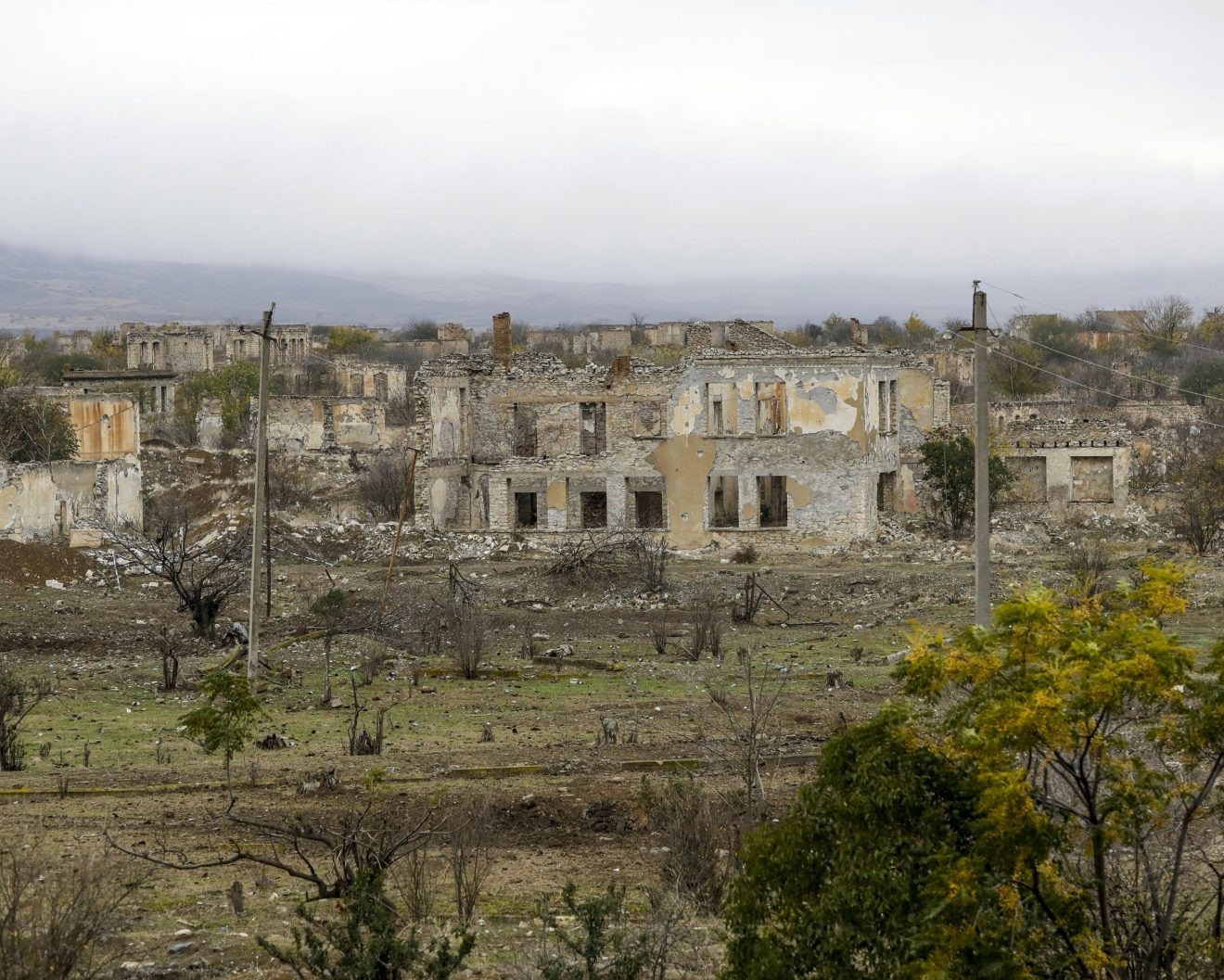
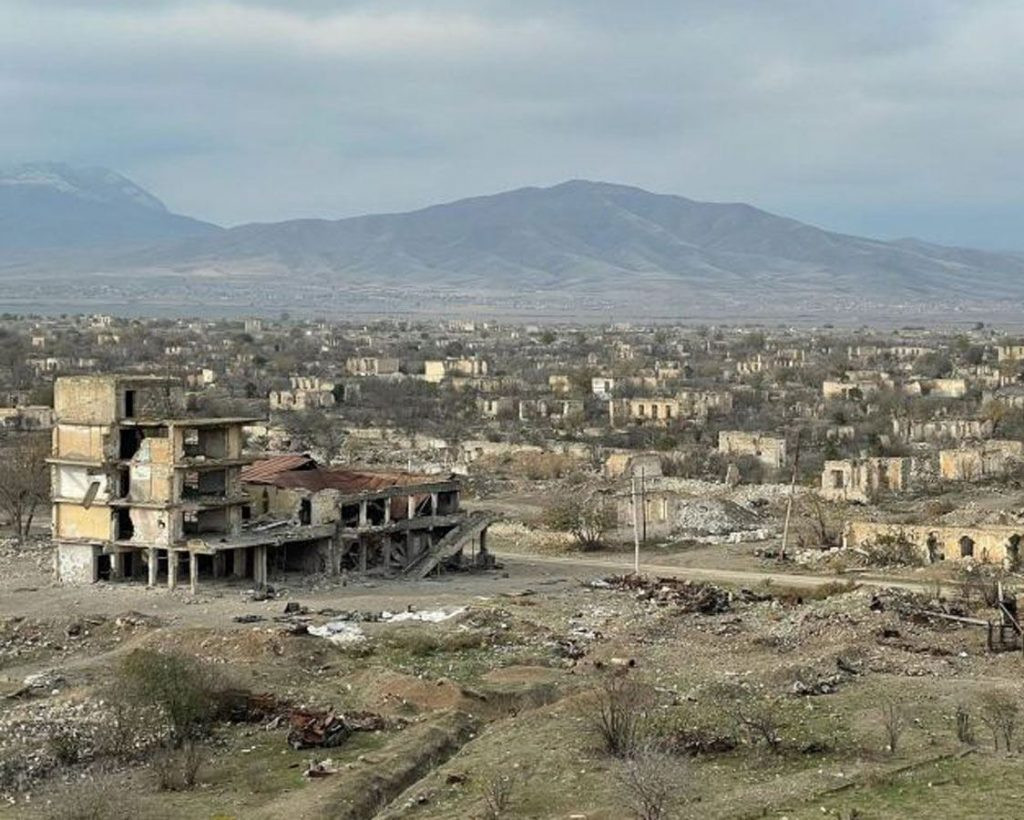
Ambassador, what do you think about claims of Armenia regarding the security and human rights of Azerbaijani citizens of Armenian origin?
Armenia continues to exploit security and human rights of citizens of Azerbaijan of Armenian origin with a view to covering up its territorial claims against Azerbaijan. In so doing, Armenia tries to impose a view on the international community that Armenians living in historic Karabakh region of Azerbaijan face existential threat, and thus cannot live in Azerbaijan. Armenia’s territorial claims has caused a bloody war of aggression against Azerbaijan in early 90s of the last century and led to drastic humanitarian, economic, social, as well political consequences for Azerbaijan and entire region. The bloody conflict unleashed by Armenia against Azerbaijan had since been a factor impeding region’s prosperity and development. Further continuation of these claims will only harm the unique opportunity for peace and security in the region emerged in the aftermath of the signing of the Trilateral Statement of 10 November 2020. Separatism and secessionism of Armenians living in the territory of Azerbaijan has been brazenly manipulated in order to suppress Azerbaijan’s efforts to pursue independent policy for the benefit of its own population, peoples of the region, as well as our partners in the region and beyond. Armenians were massively transferred into the historic Karabakh region of Azerbaijan from neighboring countries in early 19th century and have since been exploited as a tool to manipulate and influence regional issues. This became also the case in late 1980s in the context of dissolution of the Soviet Union and regaining of independence and sovereignty by Azerbaijan. Despite the tragic consequences of armed aggression of Armenia in early years of independence, Azerbaijan has managed to strengthen its independence and statehood as a self-reliant country able to contribute to regional peace, security and cooperation. Over the years since its independence, Azerbaijan has been able to position itself as a vanguard of the entire region into a platform of dialogue and cooperation through landmark regional and trans-regional energy and transportation projects and demonstrated itself as a reliable partner in many respects. In this context, sovereignty and territorial integrity of Azerbaijan continues to be a vital factor for preserving region’s development and prosperity. Armenia’s false claims regarding the security and well-being of ethnic Armenians living in the territory of Azerbaijan is also unsubstantiated in the face of strong track record of Azerbaijan as a multi-ethnic and multi-confessional country, where ethnic and religious groups have been living side-by-side for centuries in an atmosphere of harmony and mutual respect. Azerbaijan has been consistent in declaring its determination at the highest level that it is determined to ensure all the rights and freedoms of its citizens of Armenian origin. In the period following the signing of the 10 November Trilateral Statement and end of military activities, Azerbaijan has in practice taken several steps demonstrating its true intention of normalization of relations. This includes the smooth operation of Goris-Qafan road, a part of which runs inside the territory of Azerbaijan; facilitation of movement of citizens, vehicles and cargo through the „Lachin corridor” for humanitarian purposes; opening routes inside the country for procurement of peacekeeping contingent of the Russian Federation and delivery of humanitarian aid; facilitation of electricity delivery into the area where the peacekeeping contingent is temporarily deployed. Azerbaijan has also provided its infrastructure for the delivery of gas from Russia to Armenia in view of difficulty encountered in operation of the pipeline through the territory of Georgia.
Armenian side claims that Azerbaijan violated the sovereign territory of Armenia. Is it true?
Absolutely not true. After the withdrawal of Armenia’s armed forces from the occupied territories and in accordance with the Trilateral Statement of 10 November 2020, Azerbaijan is in the process of restoring its internationally recognized borders and establishment of border protection system thereon. It should be emphasized that the reason for the border issues is Armenia’s illegal occupation of Azerbaijan’s territories till November 2020, including border districts of Kelbajar, Lachin, Gubadly and Zangilan. Hence, it is Armenia that violated Azerbaijan’s internationally recognized borders and Azerbaijan is only restoring its borders. Azerbaijan has always stood for the respect of the sovereignty, territorial integrity and inviolability of the internationally recognized borders. We call on Armenia to do the same and recognize and respect the sovereignty, territorial integrity, internationally recognized borders of Azerbaijan. Mutual respect for these principles, establishing on this basis good neighborly relations and embarking on border delimitation/demarcation process in good faith is the only way forward to settle any dispute that might arise. It should be also emphasized that Armenia and Azerbaijan have newly emerged from the war and successful border demarcation and delimitation is key for peace and security. The border demarcation and delimitation process are a bilateral issue and third countries should refrain from interference in it. Attempts by third countries to interfere in the process do not serve stability but aggravates tensions. Azerbaijan is strongly committed to peace, security and regional cooperation on the basis of respect for sovereignty, territorial integrity and inviolability of the internationally recognized borders. It is surprising that the Armenian side reacts inadequately and makes provocative statements. We call on Armenia to drop this issue as a political tool in connection with the pre-election situation in this country. We recommend that the political and military circles of Armenia accept the reality of the interstate border regime along the Zangilan, Gubadli, Lachin and Kalbajar regions of Azerbaijan, not unreasonably aggravate the situation in the region and work with the Azerbaijani side in a constructive way to solve border issues through the bilateral channel. Such cases can and should be resolved through mutual contacts between relevant border authorities on both sides. Azerbaijan is committed to resolving tensions in the region and calls for appropriate steps to be taken to that end.
Could you inform us about post-conflict situation and steps taken by Azerbaijan to ensure peace, security and cooperation in the region?
Azerbaijan entered into a new stage of post-conflict rehabilitation, reconstruction and reintegration. The Government has already initiated practical steps aiming at eliminating consequences of decades-old occupation of the territories accompanied by massive destruction. Azerbaijan is resolute to re-integrate its citizens of Armenian origin residing in conflict- affected territories into its political, social, economic space, guaranteeing the same rights and freedoms with all the citizens of Azerbaijan regardless of their ethnic, religious affiliation. The Constitution of the Republic of Azerbaijan provides the solid legal framework in this regard. Sustaining peace, rehabilitation and reconstruction activities, return of IDPS and refugees, should be absolute priority. To this end, Azerbaijan is ready to work with relevant international partners, including ICRC, UNHCR and other UN agencies as well as individual States, which are willing to contribute to peace and stability in the region, in full compliance with the United Nations Guiding Principles on humanitarian assistance of 1991. Such an approach is based on international law, relevant resolutions and documents regulating UN’s activities in the fields of humanitarian assistance, post-conflict rehabilitation and reconstruction, and will serve as a confidence-building measure aimed at healing the wounds of the conflict.The resolution of the conflict opens up new perspectives for regional cooperation, development and prosperity through normalization of relations between Armenia and Azerbaijan. The 10 November 2020 Joint Statement has been further complemented with a Trilateral Azerbaijan-Russia-Armenia Statement of 11 January 2021, which specifically deals with opening of communications in the region.With the signing of the Trilateral Statement on 11 January 2021 Azerbaijan, Armenia and Russia has started to work on concrete directions with a view to opening transport communications in the region. Re-vitalization of communications will significantly boost trade and transportation through Armenia and Azerbaijan for the benefit both of these countries and our partners. It will be a significant factor of normalization and play its positive role for laying down the conditions for sustainable peace and stability in the region and beyond. Over past years, Azerbaijan has proved itself as a reliable partner in promoting connectivity and transport communications in different directions. Azerbaijan has demonstrated itself as a true bridge-builder between the East and West, North and South through initiating or implementing numerous landmark projects. In the process of opening a new direction of regional and trans-regional connectivity in accordance with the trilateral statements, Azerbaijan’s role is also central and vital. Azerbaijan is ready to play its pivotal role to transform our region into a platform of cooperation and mutual benefit. It is our principled position that the international community should exert pressure on Armenia to abandon revanchist approaches and instead, seize the unique opportunity for sustainable peace and development. Full implementation of the trilateral statements both in letter and spirit has no alternative on the way to eliminating all the consequences of the war and building a prosperous future for all countries and their peoples in the region.
Ambassador, you have mentioned rehabilitation and reconstruction activities launched in the territories liberated from the occupation. Could you give us more information about the work implemented there?
In this war, we not only restored our territorial integrity but also destroyed Armenian fascism. This is a historic mission we have completed and not only for the Azerbaijani people but also for the whole world. Armenian fascism has been annihilated. It has been destroyed by the Azerbaijani people and we will not let Armenian fascism the opportunity to raise its head again. We cannot allow Armenia to bring its army to a state that would pose threat to us again, because it is an issue of national defense and a matter of national security for us. All foreign visitors can see today Armenian vandalism with their own eyes. It is unprecedented barbarism. There have been many wars in history but such cruelty and enmity has never happened in the history of wars. Even if we compare it to World War II, there was no such vandalism at the time. Of course, we will never forget Armenian vandalism. The primary goal of creating the Military Trophy Park, which parts of the Iskander-M missile were deliberately placed in an open display there, has caused a great stir in Armenia, is for the Azerbaijani people to never forget that vandalism.
At the current stage, work is under way in various directions there. The process of mine clearance is under way. The biggest challenge is associated with the fact that Armenia does not provide us with the minefield maps. They refuse to do hand them over although we know for certain that they have them. The refusal to do so is yet another war crime on Armenia’s part. Due to its failure to provide maps of the minefields after the end of the war, more than 100 of our civilians have been killed and injured. We will try to mobilize all our resources to the maximum to ensure rapid pace of demining efforts. Simultaneously, servicemen from Turkey and Russia are engaged in this work and providing assistance in this area. The Ministry of Defense has cleared the largest area so far.
We started work in all areas immediately. That is an extensive work, the liberated lands are four times the size of Luxembourg. We must rebuild from scratch a territory four times the size of Luxemburg because the contemptible enemy has destroyed everything, every single building on these lands. The key infrastructure projects have been launched. The electricity supply to the liberated territories will be completed by the end of this year. Power lines are being extended and new substations are being built. The city of Shusha is fully supplied with electricity today. Master plans of all cities in the liberated territories are being prepared. The first “smart village” pilot project will be implemented in Zangilan district.The construction of the Fuzuli international airport is progressing swiftly. Soon, the construction of a new airport will commence in Zangilan district. The third airport will be built in Lachin district. Work is progressing in all directions related to the road infrastructure. First of all, the Fizuli-Shusha road, the Victory road, is under construction. In parallel, the railway infrastructure of Barda-Aghdam and Horadiz-Zangilan-Aghband is being created. This road will reach the Zangazur corridor, which connect the western part of Azerbaijan to its exclave part – Nakhchivan Autonomous Republic.
Despite the fact that all our historical and religious sites have been destroyed, we must look to the future. We must take the necessary steps to secure our interests. The creation of the Zangazur corridor fully corresponds to our future national and historical interests. Our primary rival is time because the construction of a railway and a highway takes time. Therefore, all resources have been mobilized to implement this project. Thus, the Azerbaijani people will return to Zangazur, which was taken away from us 101 years ago.
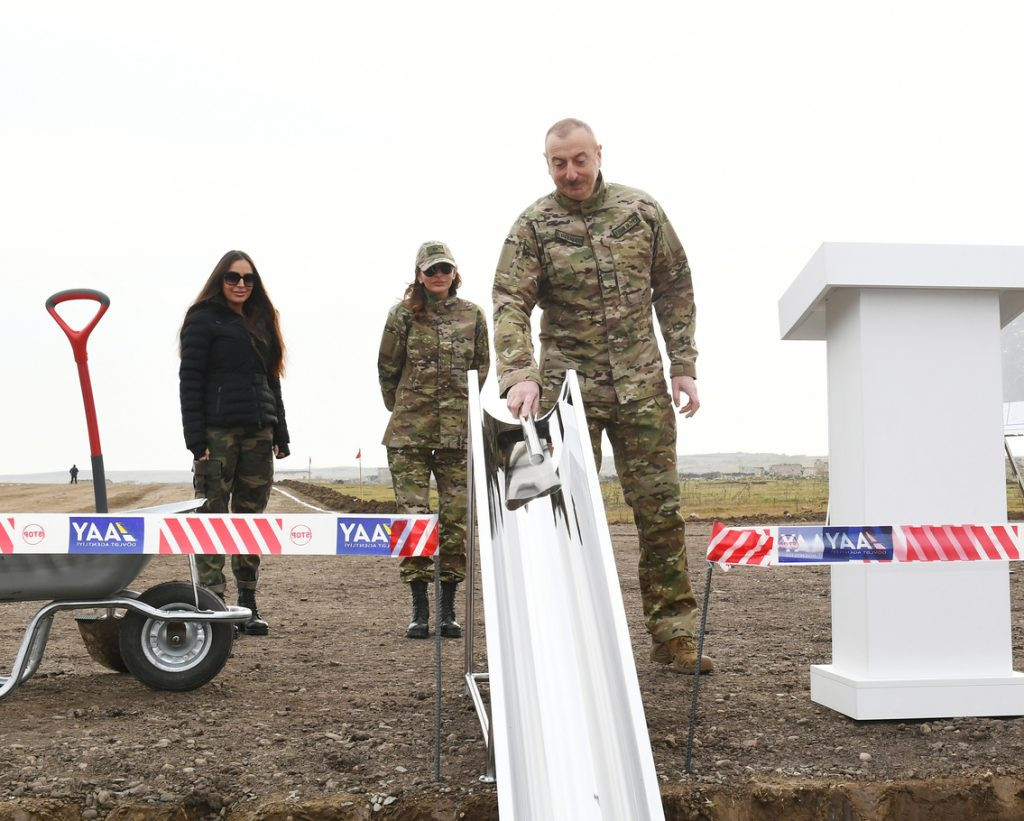

I would like to conclude my interview on optimistic notes. As President Mr. Ilham Aliyev stressed on May 20, 2021 at the online conference of the Nizami Ganjavi International Center’s web discussion themed – The South Caucasus: Regional Development and Prospective for Cooperation, on the South Caucasus, Azerbaijan is prepared to work with Armenia on the peace treaty. We hope that there will be more clarity on this matter after the elections in Armenia. The peace treaty stipulates the recognition of the territorial integrity of both countries, and we are ready for that. There is a need for a delimitation of borders to end the war and minimize or eliminate military confrontation risks. The Nagorno-Karabakh conflict is over, the time has come to think of the future, and all of that requires joint efforts.
Thank you. It was a very informative interview Mr. Ambassador.
Thank you.

